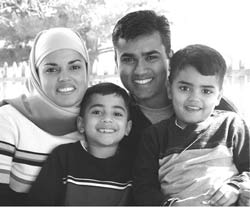
Appel à contributions
Beyond the ’patriarchal family’ : Forms of uxori /matrilocality and matrifocality in Islamic Societies. Past and Present
Avant le 17 juillet - Bamberg (Allemagne)
University of Bamberg, Bavaria, Germany, 9 et 10 December 2011
The aim of the conference is to challenge the common perception that Islam and patriarchalism are inextricably intertwined by bringing together historical and anthropological researches focusing on forms of uxori†/matrilocality and matrifocality in the Islamic world.
On the one hand, the conference aims to address historical cases indicating the presence of uxori/matrilocality and/or matrifocality in the context of marriage, family relations and gender orders situated in so called Islamic "patriarchal" societies. A common feature of such alternative social formations, whether uxori†/matrilocal or matrifocal, is that they may enhance female agency and power by limiting the role of husbands and fathers to that of guests in the households of their wives/mothers in law and children (such as in some parts of Southeast Asia or Yemen). Such a guest status for men might be due to the historical transformation of kinship and marriage systems (such as in Islamic Southeast Asia or in Africa), to working conditions as in the case of traveling traders, scholars or workers, or even to the peculiarities of specific Islamic law schools as in the case of the Shiâ mutâ marriage.
On the other hand, we are interested in case studies dealing with contemporary changes in family and gender relations brought about by globalization processes, such as the large scale work migration of men, diaspora, war and violence, and economic pressures. Particularly, in the Middle East, where the "patriarchal family" was deemed to be the general pattern, such globalization processes have given rise to fundamental social and demographic changes in that many villages and town quarters nowadays are solely inhabited by women, children, and the elderly, whereas the younger and middle†aged men are living as migrants elsewhere or being imprisoned, exiled or involved in war. It is thus a timely question whether "patriarchal" orders can be maintained in the absence of men. In recent anthropological researches it has been observed that "women without husbands" maybe empowered by assuming new gender roles which formerly would have been considered as impossible.
We invite both historical and contemporary case studies dealing with various manifestations of uxori/matrilocality and matrifocality as they present themselves in different regions of the Islamic world, thereby reflecting on their social, juridical and cultural implications.
The workshop is jointly organized by the Chair of Islamic Studies of the University of Bamberg (Patrick Franke) and the Institute of Social Anthropology of the University of Münster (Laila Prager). A selection of the conference papers is to be published in the new book series Gender and Sexuality in Islam†by Gerlach Islamic Press.
Proposals can be sent electronically. Please send copies both to patrick.franke@unibamberg.de and Laila.Prager@gmx.de by July 17, 2011. Paper proposals sent by mail must reach us by the same date, with one copy each should be sent to : Prof. Dr. Patrick Franke, Lehrstuhl für Islamwissenschaft, An der Universität 11, 96045 Bamberg and Ass. Prof. Dr. Laila Prager, Institute of Ethnology, University of Münster, Studtstr. 21 ; 48149 Münster. Proposals should not exceed two single spaced pages.
Fichiers de syndication :
Statistiques :
Le site contient 4383 articles
